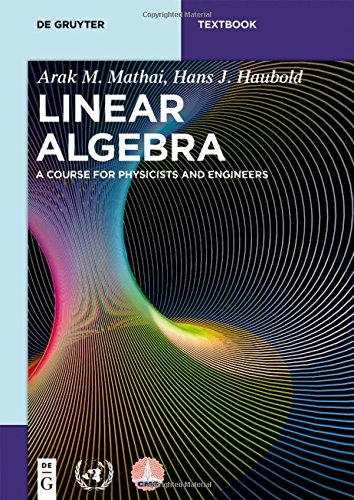
Linear Algebra: A Course for Physicists and Engineers
by Arak Mathai, Hans J. Haubold
Publisher: De Gruyter Open 2017
ISBN-13: 9783110562507
Number of pages: 450
Description:
In order not to intimidate students by a too abstract approach, this textbook on linear algebra is written to be easy to digest by non-mathematicians. It introduces the concepts of vector spaces and mappings between them without dwelling on statements such as theorems and proofs too much. It is also designed to be self-contained, so no other material is required for an understanding of the topics covered.
Download or read it online for free here:
Download link
(multiple formats)
Similar books
 Linear Algebra: An Introduction to Mathematical Discourse
Linear Algebra: An Introduction to Mathematical Discourse- Wikibooks
The book was designed specifically for students who had not previously been exposed to mathematics as mathematicians view it. That is, as a subject whose goal is to rigorously prove theorems starting from clear consistent definitions.
(12622 views)
 Linear Algebra
Linear Algebraby David Cherney, Tom Denton, Andrew Waldron - UC Davis
This textbook is suitable for a sophomore level linear algebra course taught in about twenty-five lectures. It is designed both for engineering and science majors, but has enough abstraction to be useful for potential math majors.
(9267 views)
 Linear Algebra with Applications
Linear Algebra with Applicationsby W. Keith Nicholson - Lyryx
The aim of the text is to achieve a balance among computational skills, theory, and applications of linear algebra. It is a relatively advanced introduction to the ideas and techniques of linear algebra targeted for science and engineering students.
(51636 views)
 Linear Algebra: Foundations to Frontiers
Linear Algebra: Foundations to Frontiersby M.E. Myers, P.M. van de Geijn, R.A. van de Geijn - ulaff.net
This document is a resource that integrates a text, videos, and hands-on activities. It connects hand calculations, mathematical abstractions, and computer programming. It encourages you to develop the theory of linear algebra by posing questions.
(8714 views)